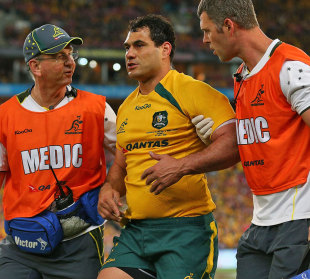|
International Rugby
Doctor links case of dementia to playing rugby
ESPN Staff
August 3, 2013

The George Smith incident in the third British & Irish Lions Test brought the issue of concussion under the spotlight
© Getty Images
Enlarge
Brain injuries expert Dr. Willie Stewart has claimed to have found a case of early onset dementia which was linked to the individual having played rugby. The neurologist examined brain tissue for 'abnormal proteins' which are associated with head injuries and dementia. And he said in the case of the rugby player, aged in his 50s, the individual had higher numbers of these proteins than a retired boxer who was suffering with dementia pugilistica, which is also known as punch drunk syndrome. "What we are finding now is that it is not just in boxers," Dr. Stewart told the BBC. "We are seeing it in other sports where athletes are exposed to head injury in high levels. Those sports include American football, ice hockey and also now I have to say I have seen a case, the same pathology, in somebody whose exposure was rugby. "What the numbers are, what proportion of people who play rugby, how often you may have to get concussed, how long after you may develop problems, these are questions we can't answer." Dr. Stewart added the number of players affected by the condition would be a "fairly low number, but not a zero number. Let's say it is 1% of people who are playing rugby at international level may go on to develop long-term problems. "In any Six Nations weekend that is one or two players who may go on and develop a dementia they wouldn't otherwise have been exposed to. That is a realistic number." The International Rugby Board is currently under-fire for its Pitchside Suspected Concussion Assessment (PSCA) which was brought in throughout the game last year. The test sees players who have suffered a suspected concussion leave the field for five minutes while the doctors determine whether they are fit enough to return to the pitch by asking the player a series of questions. But former IRB medical advisor Dr Barry O'Driscoll hit out at the governing body and called for it to review its protocols after an incident in the third British & Irish Lions Test. Australia flanker George Smith suffered an early clash of heads with Richard Hibbard and despite looking dazed and confused, Smith passed the PSCA and was back on the field minutes later. Former Scotland international Rory Lamont also revealed last week that he was forced to play on through injury and labelled the IRB's concussion protocols "flawed". Dr. Stewart said the "general advice for a concussion is if in doubt, sit it out". He added: "So at all levels, if you think there has been a concussion the player should be removed and not expose himself to risk. There is a risk that a second head injury, coming within a short space of time and before the brain has properly recovered, can be much more severe and cause more problems and more symptoms. "There is undoubted evidence that people will try to play on. That is something we would really like to discourage as much as possible. Just as we discourage people from playing on with a damaged knee, even more so we would really try not to have people carry on with a damaged brain."
© ESPN Sports Media Ltd
|
Live Sports
Communication error please reload the page.
-
Football
-
Cricket
-
Rugby
-
- Days
- Hrs
- Mins
- Secs
F1 - Abu Dhabi GP
Abu Dhabi Grand Prix December 11-131. Max Verstappen ()
2. Valtteri Bottas (Mercedes)
3. Lewis Hamilton (Mercedes)
4. Alexander Albon ()
5. Lando Norris ()
6. Carlos Sainz Jr ()
-
ESPNOtherLive >>
Snooker - China Open
Tennis - Miami Open

